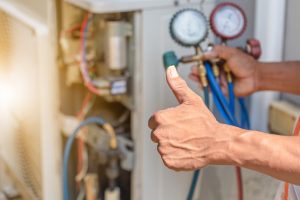HVAC Repair: Is It Time For Replacement vs. Repair?
Posted on March 15th, 2020 by carrolladmin

If your heater or air conditioner seems to be going out, you might wonder if it’s time to replace it. Replacing an HVAC system is expensive, but at times it might be necessary. If it isn’t necessary, however, it can mean spending thousands more than you need to maintain a comfortable temperature in your home.
Here, we’ll discuss how to decide whether to repair or replace your current HVAC system.
HVAC Repair vs. Replacement: Questions To Ask
Deciding whether to repair or replace your heating and cooling system comes down to a few questions about the costs involved. Would it be worth the costs of repairs, or would the replacement be more cost-effective in the long run? These questions can help you decide.
Is it an easy fix?
First of all, you should determine if it’s an easy fix. If your system isn’t performing as well as it should, it could be something as simple as a clogged filter or worn part. In those cases, fixing the issue is usually cheapest, at least for the short-term.
Often, these types of issues are preventable with routine maintenance. Heating and cooling systems should be inspected annually, and your air filters should be checked monthly. Keeping up on this preventive maintenance will ensure your system runs longer and more reliably.
How old is the unit?
The next question you should ask is about the age of the unit. If it’s more than 10 years old, it’s usually best to replace it. After that point, it’s likely to keep breaking down more and more, and it won’t operate as efficiently.
However, a new or middle-aged unit could benefit from repairs, even if it has completely broken down. Regular maintenance can prolong the life of your unit, allowing you to get the very most out of its initial costs.
How much would HVAC repairs cost?
If you have a more significant issue on hand than the minor fixes you might face, weighing replacement vs. repair can be more difficult. In those cases, it’s worth seeing how much repairs would cost compared to the value of the unit.
A general rule of thumb to apply here is if the repair costs would be over half the current value of your system, it’s probably worth replacing. Another measurement method is to multiply the repair costs by the unit’s age. If it’s over $5,000, replacement is probably the most cost-effective choice.
How has the system been performing lately?
A system that breaks down often is either poorly maintained or old. In either case, a system that keeps going out on you may be best to replace. Newer units perform better and use less energy, meaning it will pay for the upfront cost over time. You’ll also be spared the costs of frequent breakdowns.
Even issues that might seem minor may warrant replacement. If your unit has been making noise or performing poorly in terms of temperature control, and if those issues have been occurring frequently, you’ll likely benefit from a total replacement.
Additional considerations
In addition to the technical issues your system might be facing and the raw costs, there are some other matters to consider. These include:
- Plans to move out of the house soon
- Potential tax benefits from upgrading to a newer system
- The value of getting a new warranty to cover parts
- The costs of replacing old and outdated parts
If you’re planning to move out, then replacing the system may not seem strictly necessary. However, doing so could allow you to ask for a higher sale price, so it’s worth considering.
Other benefits, such as tax benefits or a new warranty, could offset the cost of replacing your current system, making the investment worthwhile in the long run.
Signs Your System Needs Replacement
When contemplating whether to get a new heating system or air conditioner, the following are signs that it might need to be replaced:
- Frequent breakdowns
- Consistently poor or uneven heating and cooling despite regular repairs
- Unit is more than 10 to 15 years old
- Constant noise or odd smells
- Energy bills keep going up
- Allergies keep getting worse
If these problems keep happening, you’ll likely save money in the long run if you replace it. Note, however, that if these issues aren’t frequent or if your system is still new, you’d probably be best served by getting a technician to repair it.
Signs Your System Needs Repairs
Often, replacement isn’t necessary. In these cases, repairs should help prolong the life of your HVAC system. To determine if you need repairs, consider these symptoms:
- Recently poor heating and cooling
- Leaks
- New odd noises or unusual smells
- Short cycling (the unit turns on and off too frequently)
- Allergy symptoms are worse than usual
If your system is less than 10 years old and if these issues aren’t occurring frequently, you’ll likely be best off with HVAC repair, particularly if it’s well maintained otherwise.
HVAC Repair Or Replacement? Making The Right Choice
When choosing to repair or replace your existing system, look for the signs and ask yourself the questions listed above. Doing so will give you a clear idea of what step you’ll need to take next.
Contacting a qualified HVAC service provider, like Carroll Plumbing, can give you more insight into what your system needs to keep running, whether that’s repairs or complete replacement. They’ll then perform the agreed-upon service(s) from minor repairs to new system installation.






